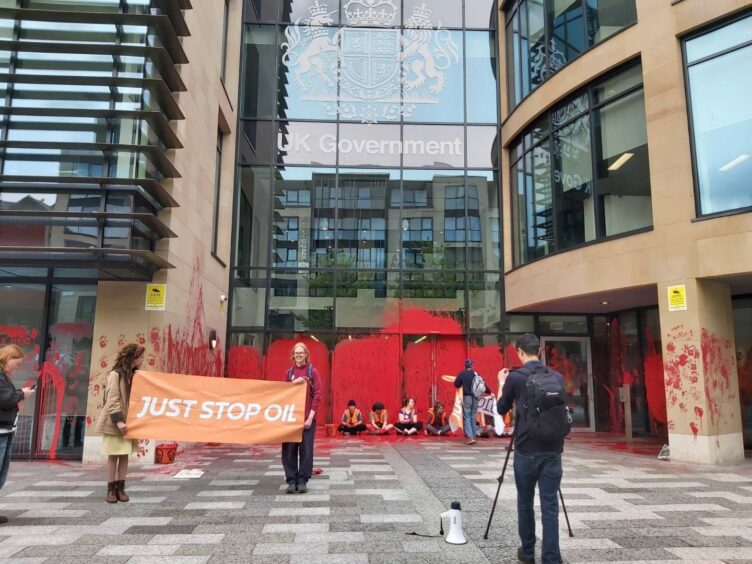
The UK legal system makes it “nearly impossible” to challenge new oil and gas developments on climate grounds, according to an Aberdeen University lecturer.
Speaking at a Westminster energy policy event today, energy law lecturer Dr Daria Shapovalova said “we seem to be stuck” when it comes to regulation for integrating climate and energy governance.
She said: “It appears that any legal challenge for new developments on climate grounds really crumbles because the law provides for an almost unlimited discretion to the regulator and currently there are no statutory requirements for comprehensive climate assessments as such.”
There’s been a series of attempts in recent months to challenge developments like BP and Ithaca’s Vorlich and Shell’s Jackdaw field, as well as the strategy of the regulator, the North Sea Transition Authority.
However, the regulator is imposing climate checkpoints for new projects.
Dr Shapovalova said: “The current regulatory and judicial approach for, at least environmental appraisals, makes it nearly impossible to challenge any new developments on climate grounds but there is some development in the North Sea Transition deal and the proposed climate compatibility checkpoint as the implementation of the OGA (former name for the NSTA) strategy revamps to look at net zero as well.”
NSTA questions
However, it is still unclear how the NSTA strategy will be implemented and the North Sea transition deal is not a statutory document, Dr Shapovalova said, meaning a license is not conditional in compliance with the targets set out.
The energy law lecturer explained that “the climate compatibility checkpoint, in its proposed form, is probably the most ambitious attempt to integrate climate concerns into the process of new oil and gas development authorisation.
“It looks not only at operational missions but international benchmarking, which can improve investment in new industries such as CCS (carbon capture storage) and hydrogen, global production gaps, scope three emissions and national energy security.
“I have not seen a more thorough approach to new licences than that, anywhere in any other jurisdiction, whether that ambition will be realised or not is a big question today and the messaging from the government has been quite confusing but if it’s anything to go by, the climate compatibility checkpoint ambition has really stalled before it ever had a chance to materialise.”
Wider Implications
This casts Greenpeace taking the UK government to court over its approval of the Jackdaw oil field in a new light.
From what Dr Shapovalova said at the conference, it appears that the climate activists could be fighting a “nearly impossible” battle.
Earlier this year, the climate activists announced that they were taking the UK government to court, arguing that the gas from the Jackdaw field will do nothing to help the current energy crisis or lower energy bills “because it belongs to Shell, and will be sold on international markets to the highest bidder”.
Oil and gas transition campaigner for Greenpeace UK Philip Evans said: “This Jackdaw approval is a scandal. The government knows that burning fossil fuels drives the climate crisis, yet they’re approving a new gas field in June, without proper climate checks, and declaring a national emergency over heatwaves in July.
“Meanwhile household bills are soaring, and the government is ignoring common sense solutions – like home insulation, heat pumps and cheap renewable power.
“We believe this is an astonishing dereliction of the government’s legal duty, and we won’t let it stand.
“So we’re taking legal action to stop Jackdaw, and whenever we see the government acting unlawfully to greenlight new fossil fuels we stand ready to fight in the courts.”
However, a UK Government spokesperson said the project was approved by the North Sea Transition Authority (NSTA) “on the basis of Offshore Petroleum Regulator for Environment and Decommissioning (OPRED) considering the environmental statement of the project and concluding that it will not have a significant effect on the environment.”
The points raised by Dr Shapovalova may go some way to explaining the court losses experienced by Paid for Pollute and Greenpeace against the UK government.
In October of last year, Greenpeace took the government to court in order to block production from the Ithaca Energy and BP Vorlich oilfield.
The environmental activists lost the case, with Lord President Lord Calloway ruling: “It would not be practicable… to conduct a wide ranging examination into the effects, local or global, of the use of that fuel by the final consumer.”
Activists Paid for Pollute experienced a similar situation, losing their court case against the government over its plans to continue North Sea oil recovery, which the activists claimed were in conflict with the country’s net zero goals.
Recommended for you

